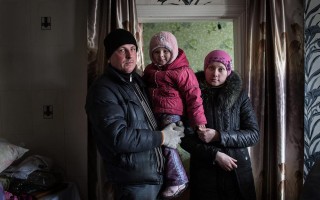Farmer. Mother. Activist.
Felisa was persecuted by an illegal armed group.
Felisa, 33 years old: “I remember that I was happy; as part of my indigenous culture we used to grow crops and we created crafts made out of palm leaves. Everything was as green as it could be; grass all around, trees as tall as mountains, our crops growing everywhere. My children had a backyard where they could run and play. I still dream whilst I am awake as if I were in the reservation; I can almost feel the warm breeze in my face again. So for this I will fight; I have always been a fighter for my family and community. Now we are forming our own council in which I could occupy an important position so my community’s dreams of having a new territory where we can grow abundant crops can come true. Just imagine, plantain, yucca, herbs bursting from the ground; my children will be hungry no more”.

“I will fight; I have always been a fighter for my family and community”.
Felisa, with her children. (c) UNHCR Colombia / D. Diaz /2015
Felisa was forced to flee her home in the Makaguán reservation near the Venezuelan border and now shares a crowded indigenous house in Tame with some other 150 people. During her childhood she had to flee several times because of threats and abuse at the hands of an illegal armed group. She has survived repeated sexual and human rights abuses. When she was 11 years old, Felisa was sexually violated by her brother-in-law; three years later she moved in with a partner who attempted to murder her and later abandoned her. Her current partner also abuses her physically and verbally. Her indigenous community, the Makaguán, is at risk of physical and cultural extinction.
Refugees. Ordinary people living through extraordinary times. Share their stories.
Like Felisa and her family, about 5.7 million people in Colombia have fled their homes due to violence. The country has been ravaged by decades-long violent conflict involving illegal armed groups and drug cartels which exact gross violations of human rights on the local population. Women are especially vulnerable; often alone and supporting children, they are unable to protect themselves or their families. Colombia sees a particularly high rate of sexual violence among displaced communities and therefore one of UNHCR’s priorities is to help combat sexual gender based violence in collaboration with partners in the field.
MORE STORIES
Katia – Gardener. Mother. Nature lover.
Katia and her family had to flee fighting twice.
Laban – Teacher. Daughter. Tailor
Laban had to leave everything behind.
Nader – Saxophonist. Dad. Mozart fan.
Nader’s family escaped sniper fire.



